Blogodogo 1/2
Table of Contents
Overview
- 44 solves / 417 points
- Difficulty: Medium
- Overall difficulty for me (From 1-10 stars): ★★★★★★★★★★
Background
Try to see the content of the secret note of the administator user.
You can deploy an instance on : https://deploy.heroctf.fr
Format : Hero{flag}
Author : xanhacks
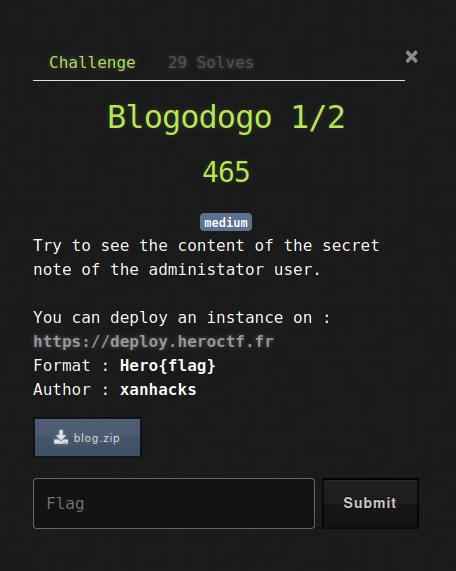
Enumeration
Home page:

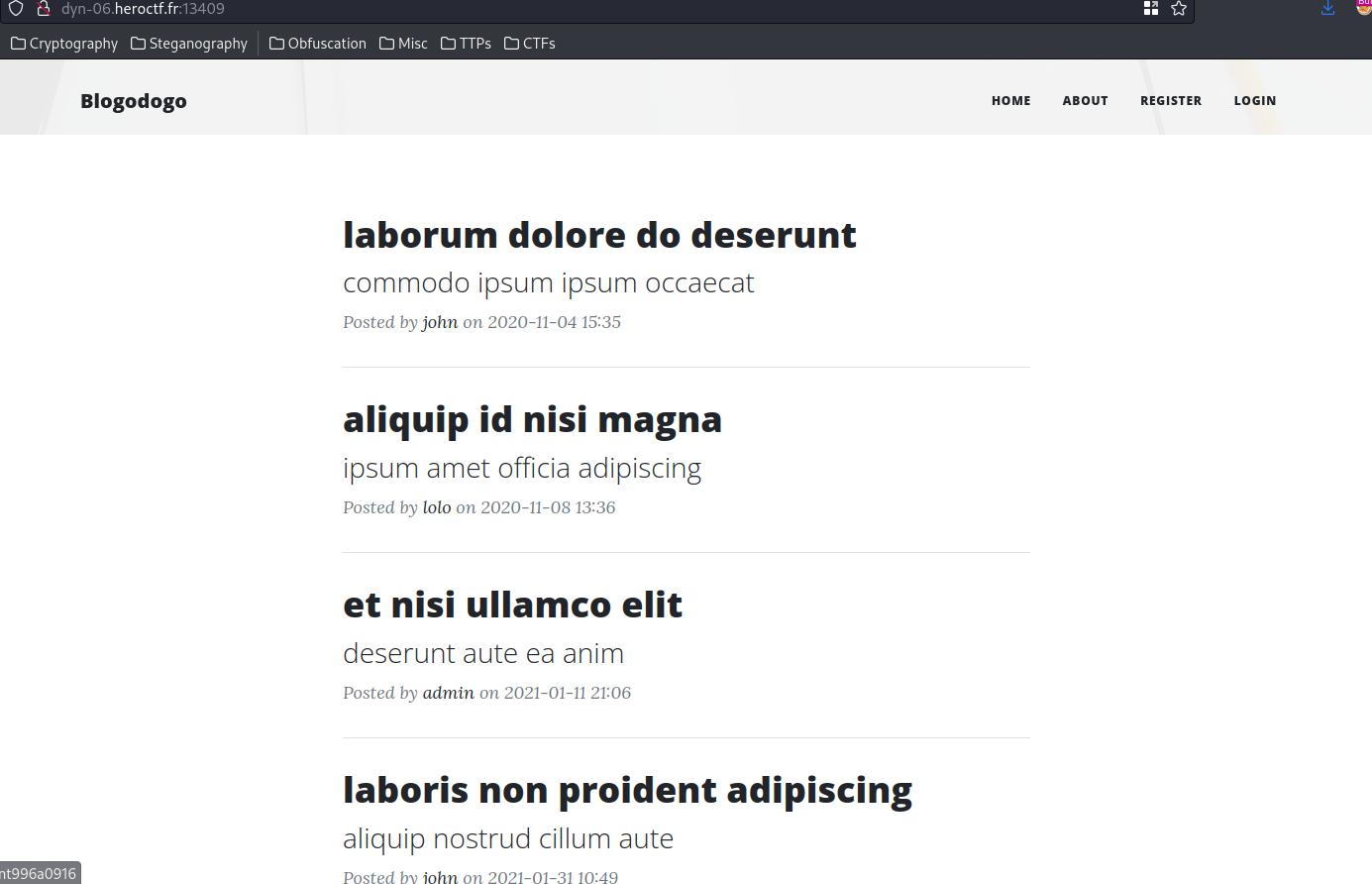
A typical blog page.
In here, we can see the admin user:
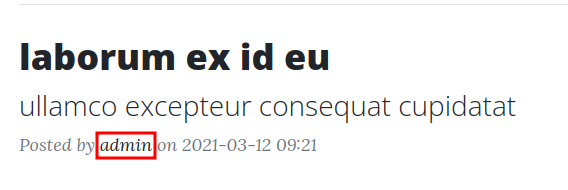
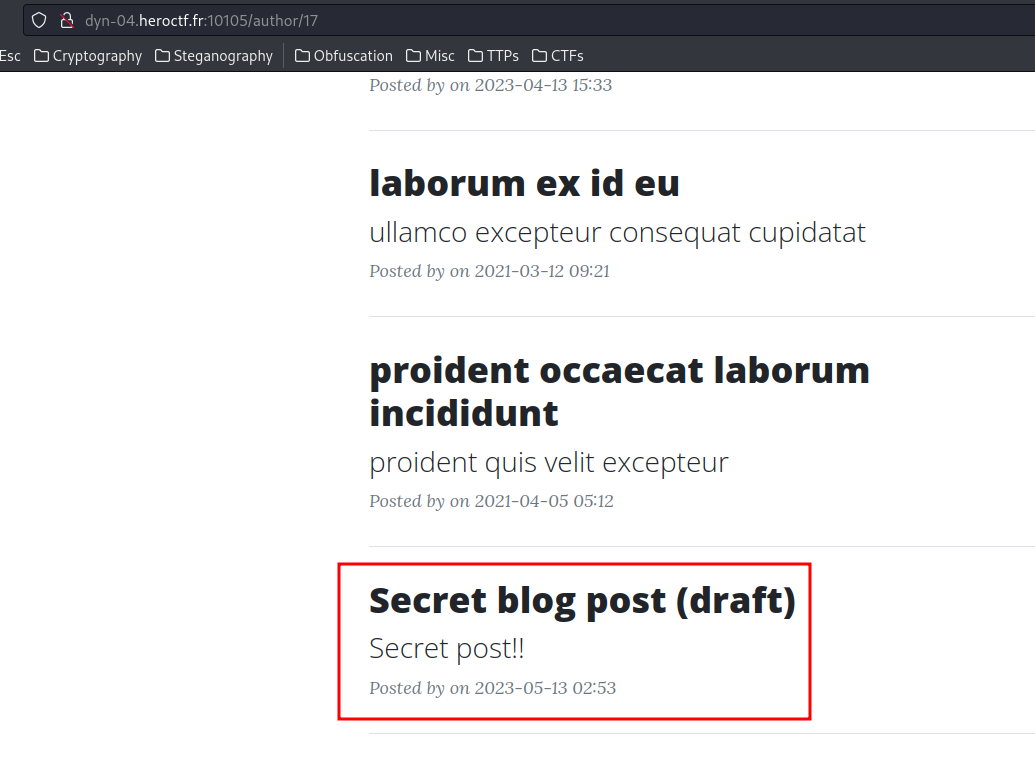
And he has a secret blog post!
When we click one of those posts, we can report a post:
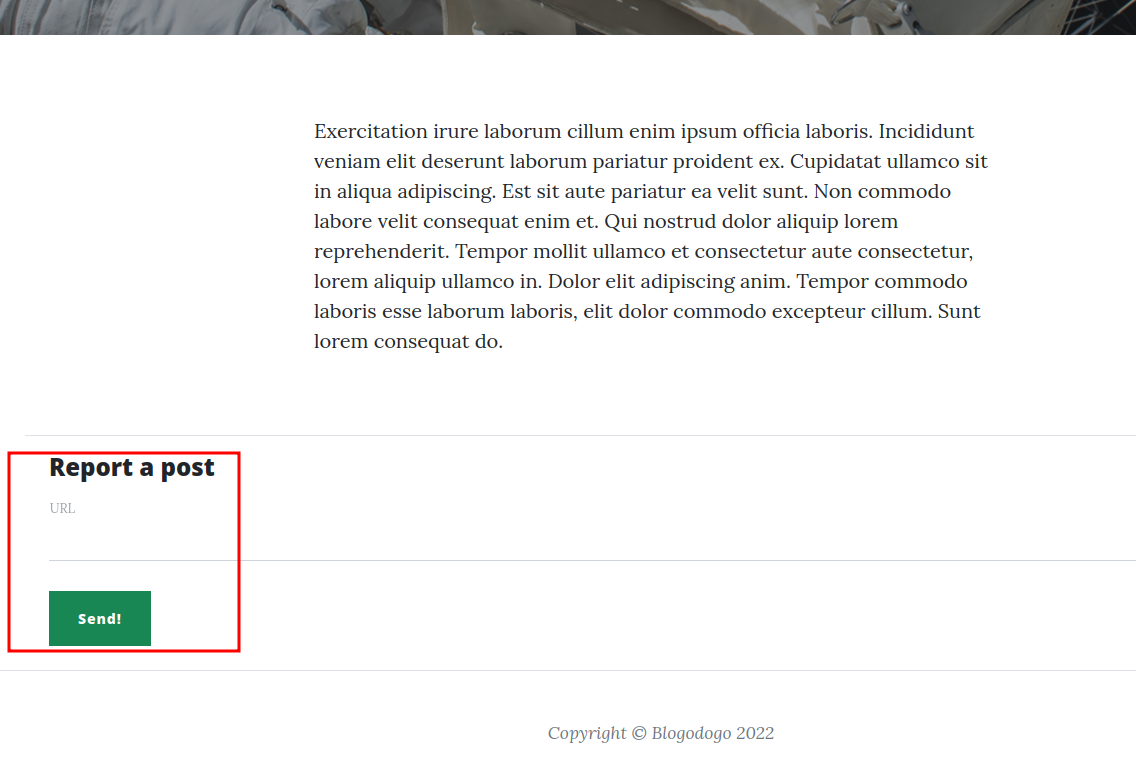
In this challenge, we can download a file:
┌[siunam♥earth]-(~/ctf/HeroCTF-v5/Web/Blogodogo-1-2)-[2023.05.13|19:59:40(HKT)]
└> file blog.zip
blog.zip: Zip archive data, at least v2.0 to extract, compression method=store
┌[siunam♥earth]-(~/ctf/HeroCTF-v5/Web/Blogodogo-1-2)-[2023.05.13|19:59:41(HKT)]
└> unzip blog.zip
Archive: blog.zip
creating: blogodogo/
inflating: blogodogo/requirements.txt
inflating: blogodogo/docker-compose.yml
inflating: blogodogo/config.py
creating: blogodogo/templates/
creating: blogodogo/templates/pages/
inflating: blogodogo/templates/pages/add_post.html
inflating: blogodogo/templates/pages/register.html
inflating: blogodogo/templates/pages/index.html
inflating: blogodogo/templates/pages/404.html
inflating: blogodogo/templates/pages/profile.html
inflating: blogodogo/templates/pages/author.html
inflating: blogodogo/templates/pages/about.html
inflating: blogodogo/templates/pages/login.html
inflating: blogodogo/templates/pages/post.html
creating: blogodogo/templates/components/
inflating: blogodogo/templates/components/flash.html
inflating: blogodogo/templates/components/footer.html
inflating: blogodogo/templates/components/base.html
inflating: blogodogo/templates/components/header.html
inflating: blogodogo/templates/components/navbar.html
creating: blogodogo/static/
creating: blogodogo/static/assets/
inflating: blogodogo/static/assets/favicon.ico
creating: blogodogo/static/assets/img/
inflating: blogodogo/static/assets/img/about-bg.jpg
inflating: blogodogo/static/assets/img/contact-bg.jpg
inflating: blogodogo/static/assets/img/home-bg.jpg
inflating: blogodogo/static/assets/img/post-bg.jpg
inflating: blogodogo/static/assets/img/post-sample-image.jpg
creating: blogodogo/static/css/
inflating: blogodogo/static/css/styles.css
creating: blogodogo/static/js/
inflating: blogodogo/static/js/scripts.js
creating: blogodogo/src/
inflating: blogodogo/src/routes.py
inflating: blogodogo/src/models.py
inflating: blogodogo/src/utils.py
inflating: blogodogo/src/__init__.py
inflating: blogodogo/src/forms.py
creating: blogodogo/bot/
inflating: blogodogo/bot/bot.js
inflating: blogodogo/bot/package.json
inflating: blogodogo/Dockerfile
inflating: blogodogo/app.py
POST route /post/report:
@bp_routes.route("/post/report", methods=["POST"])
def report_post():
url = request.form.get("url", "")
if not re.match("^http://localhost:5000/.*", url):
flash("URL not valid, please match: ^http://localhost:5000/.*", "warning")
return redirect(url_for('bp_routes.index'))
subprocess.run(["node", "/app/bot/bot.js", url])
flash("Your request has been sent to an administrator!", "success")
return redirect(url_for('bp_routes.index'))
This route will check the URL parameter is starts with http://localhost:5000/ via regular expression (regex).
/app/bot/bot.js:
// required packages
const puppeteer = require("puppeteer");
// variables
const host = process.env.HOST;
const adminUsername = process.env.ADMIN_USERNAME;
const adminPassword = process.env.ADMIN_PASSWORD;
// sleep
const delay = (time) => {
return new Promise(resolve => setTimeout(resolve, time));
}
// navigate
async function goto(url) {
const browser = await puppeteer.launch({
headless: true,
ignoreHTTPSErrors: true,
args: [ "--no-sandbox", "--ignore-certificate-errors" ],
executablePath: "/usr/bin/chromium-browser"
});
const page = await browser.newPage();
await page.setDefaultNavigationTimeout(5000);
// Setup bot context
await page.goto(host + "/login");
const username = await page.waitForSelector("#username");
const password = await page.waitForSelector("#password");
await username.type(adminUsername);
await password.type(adminPassword);
await page.keyboard.press("Enter");
await page.waitForNavigation();
// Go to provided URL
try {
await page.goto(url);
} catch {}
await delay(1000);
browser.close();
return;
}
if (process.argv.length === 2) {
console.error("No URL provided!");
process.exit(1);
}
goto(process.argv[2]);
If the regex pattern is matched, it’ll let the bot login as admin, and go to the provided URL.
Then, in GET route /post/<string:slug>:
@bp_routes.route("/post/<string:slug>", methods=["GET"])
def view_post(slug):
post = Posts.query.filter(Posts.slug == slug).first()
if not post:
flash("This post does not exists.", "warning")
return redirect(url_for('bp_routes.index'))
if post.draft and (not current_user.is_authenticated or post.author_id != current_user.id):
flash("You cannot see draft of other users.", "warning")
return redirect(url_for('bp_routes.index'))
author = Authors.query.filter_by(id=post.author_id).first()
return render_template("pages/post.html", title="View a post", post=post, author=author)
If the post is in draft, and we’re authenticated or the draft’s author ID is equal to the current user’s ID, we can view the draft’s post.
That being said, we need to somehow redirect the admin bot to the secret blog post, and exfiltrate the content of that draft post.
But how?
In GET route /post/preview/<string:hash_preview>, we can get a preview of a post:
@bp_routes.route("/post/preview/<string:hash_preview>", methods=["GET"])
def preview_post(hash_preview):
post = Posts.query.filter_by(hash_preview=hash_preview).first()
if post:
author = Authors.query.filter_by(id=post.author_id).first()
return render_template("pages/post.html", title="Preview a post", post=post, author=author)
flash("Unable to find the corresponding post.", "warning")
return redirect(url_for('bp_routes.index'))
But how can we get the hash_preview value?
Hmm… Maybe if we can exploit Server-Side Request Forgery (SSRF) in the /post/report, we could view the secret blog post?
No clue about that…